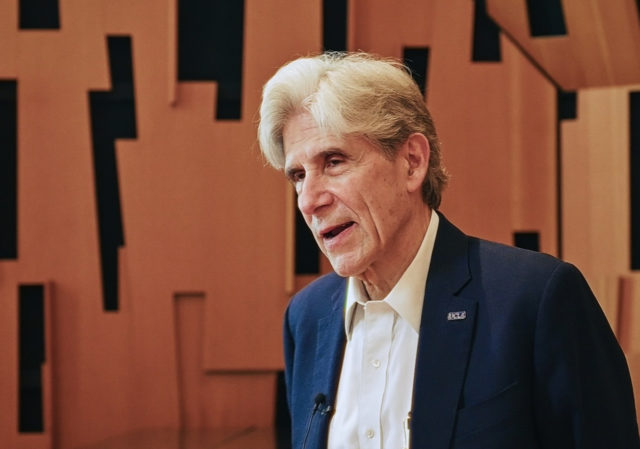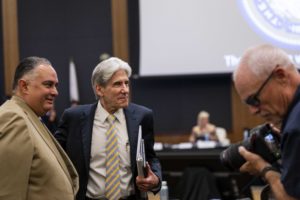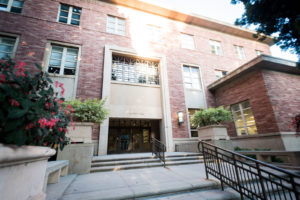This post was updated June 4 at 9:48 p.m.
Ahead of his Thursday inauguration, UCLA Chancellor Julio Frenk spoke with National News and Higher Education editor Alexandra Crosnoe and News editor Dylan Winward to discuss his experience in higher education and tenure to date.
Frenk became UCLA’s first Latino chancellor Jan. 1. He was president of the University of Miami from 2015 to 2024 and dean of the Harvard T.H. Chan School of Public Health from 2009 to 2015.
UCLA Strategic Communications gave the Daily Bruin 28 minutes to conduct a profile-style interview.
This interview has been edited for length and clarity.
Daily Bruin: How are you enjoying your time in Westwood?
Julio Frenk: Well, they’ve been very intense couple of months – actually, almost five months now – because, on my second day in the office, the wildfires erupted, so we had to switch to emergency response mode. When we were out of the acute phase of the wildfires – now we’re engaged in the reconstruction but out of the acute phase – we started getting all the barrage of federal orders and changes to the funding of research and all of those different measures. Some of the actions have gotten some of our students very nervous and worried, justifiably so. So we also had to then pivot to managing that.
In the middle of all of that, I think two things have emerged. First, when the wildfires erupted, I saw the magnitude of the challenge. I also saw the quality of the response, the way that Bruins came together in the face of an external threat coming together. That’s been very stimulating for me. I haven’t had that much time to fully enjoy the campus, but I can tell you that I already love it.
DB: What’s it been like meeting with students on campus?
JF: No disrespect, but actually talking to students, interacting with students, is the best part of the job. No disrespect for other groups like my vice chancellors or the regents. I meet with a lot of people, but this is why we work. They personify our legacy. They are the reason we get up in the morning and try to do our very best job.
The students have been very welcoming, very cordial. Because of the wildfires, I had an early exposure through the videos I was sending just to keep the community calm. In an emergency, if you don’t say anything, people fill the silence with their worst fears. That’s an experience I’ve had in emergencies, because normally, at this early stage, most people wouldn’t even know who the chancellor is. I remember when I was a student I wasn’t particularly paying attention to those things, but, because of those videos, it’s more common that they recognize me. They’ve been incredibly welcoming, and it’s just been great.
DB: We know you’ve been engaging in listening exercises since becoming chancellor. Could you talk about what you’ve learned from hearing the perspectives of students?
JF: I’ve completed, now, the listening exercise, but I’m going to do others. This first listening exercise was meant to be finished before the inauguration because my idea was that, in the inaugural address, I’m trying to articulate a vision for the future of the university, but it’s not my personal vision. I’m trying to encapsulate and reflect the collective vision that I heard, and that’s why this first listening exercise was programmed to end before the inauguration. I’ve had 38 sessions. About 6,000 people have participated, most of them in person, some in hybrid formats that we’ve had. That has included every school, the colleges, the divisions of the college, every administrative unit and then groups of students.
The two big messages I get, is, first, there’s an incredible pride of being a Bruin, and there’s a sense that this is a wonderful place to be and a strong connection to the institution. That’s very, very encouraging.
Second, there’s a lot of nervousness and anxiety.
There’s a lot of sense that things are changing very quickly, and there’s a lot of justified anxiety. In my inaugural speech, I try, first of all, to stimulate that first part – the pride – and secondly, not to deny. The anxiety is legitimate and is real, but to tackle it head on, with standing up for our values, with defending the things we feel and with the certainty that we’re going to come out of this – not just survive, but come out stronger if we do the right things. That starts by becoming closer as a community, by healing some of the divides that we still have internally, by connecting to the outside world and by standing for our values and our purpose as a university. It’s a little bit of a contrast, the bright side of great pride and the great level of uncertainty and anxiety. We need to deal with both – stimulating one and then providing some sense of purpose and direction that we’re not going to back down. We’re going to continue moving forward with our values and our purpose, which is to educate brilliant young people so that they can make a big difference in the world.
DB: I wanted to go back to your time in Miami. Could you tell us a little bit about what you learned there and how you want to apply that to your time leading UCLA?
JF: You should always expect that the unexpected will happen. I arrived in Miami – the city had been 15 years without being hit by a hurricane, but, on my second year, there was a hurricane, and we had to evacuate for the first time in its history of that campus. Then came COVID. Because of my public health training, I decided to keep the university open for classes – giving the choice to students – but 80% of the students chose to come back when they heard my plan and the parents heard my plan. We invested about $35 million to make the campus safe.
I learned first to always expect the unexpected. So when I was here and on my second day wildfires erupted, I didn’t know that was going to happen, but I was expecting that something unexpected was going to happen, and, indeed it did happen. That’s a big lesson. Don’t let that unexpected event get into you and control your feelings. Stay calm. Think of whatever it is – the wildfire or the executive orders that affect us – think of it as an object. You can look at it. You can turn it around. It’s a little box. Understand what’s going on, and then say, “How am I going to tackle this thing?” Those were important lessons.
The big learning for me is that universities are essential institutions. They’re essential for democracy. They need to be defended, and, at a time when we have lost a lot of the public’s trust, we need to actively regain that trust by doing what we do in great ways, by connecting to the community, by showing that we are here to serve society. The former president of Harvard, when I was there, Drew Faust, had quoted a phrase that I’ve made my own. She said “higher education is the life insurance policy of democracy,” and that’s something I have learned to value fully.
DB: I know that Chancellor Block made a habit to come and visit the Daily Bruin every quarter and talk about the university. Is that something you’re planning to do?
JF: It’s finals and there’s commencement, but let’s make a date as soon as the new academic year starts. I will be at the Daily Bruin, and we will have a good chat.
Contributing reports by Dylan Winward, News editor






Comments are closed.